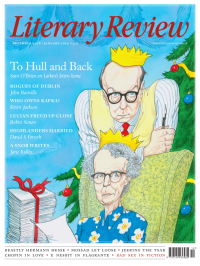Brian Dillon
Squares in His Eyes
Josef Albers: Life and Work
By Charles Darwent
Thames & Hudson 335pp £24.95
Between 1950 and his death in 1976, the German artist and designer Josef Albers painted more than 2,000 compositions in a series titled Homage to the Square. They are nearly all thinly executed on Masonite boards and most involve concentric squares of colour that frame an implied vanishing point below the middle of the painting. Or is it, rather, that they project this point towards us? The illusions and perplexities of these works have often been compared to those of op art, while their austerity recalls Malevich’s Black Square of 1915 and the angles and planes of 1960s minimalism. In fact, none of these comparisons apply. Albers was engaged in a rigorous but idiosyncratic study of the ways colours behave together. It was an ambitious and repetitive project that the artist (a modest sort of egoist) described in everyday, oddly culinary terms, inscribing a ‘recipe’ for each individual work on its reverse. Filmed in his studio in 1969, Albers declared: ‘It is like making sandwiches.’
The character who emerges from Charles Darwent’s elegant biography of Albers is quite of a piece with the combination in his Homage series of the lofty and the down-to-earth. An ex-student of his – Albers taught at the Bauhaus, Black Mountain College and Yale – recalled a pedagogic personality

Sign Up to our newsletter
Receive free articles, highlights from the archive, news, details of prizes, and much more.@Lit_Review
Follow Literary Review on Twitter
Twitter Feed
'A charming and amusing personal history'
Don't miss this brilliant @Lit_Review review of #WorldCupFever 👇
@KuperSimon's must-read footballing journey in nine tournaments is out now ⚽️🏆
Michael Taylor - The Beautiful Game
Michael Taylor: The Beautiful Game - World Cup Fever: A Footballing Journey in Nine Tournaments by Simon Kuper; Th...
literaryreview.co.uk
In the summer of 1918, the Caspian port of Baku played host to a remarkable group of Allied soldiers, sent to defend oil wells against the Ottomans.
Anna Reid recounts their escapades.
Anna Reid - Mission Impossible
Anna Reid: Mission Impossible - Mavericks: Empire, Oil, Revolution and the Forgotten Battle of World War One by Nick Higham
literaryreview.co.uk
Alfred, Lord Tennyson is practically a byword for old-fashioned Victorian grandeur, rarely pictured without a cravat and a serious beard.
Seamus Perry tries to picture him as a younger man.
Seamus Perry - Before the Beard
Seamus Perry: Before the Beard - The Boundless Deep: Young Tennyson, Science, and the Crisis of Belief by Richard Holmes
literaryreview.co.uk